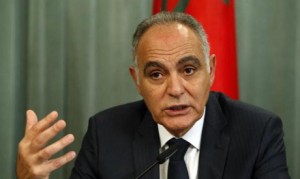Ahram Online
Samar Al-Gamal
Salaheddine Mezwar talks about the planned Arab joint military force, and the likelihood of it intervening in Libya.
Recent airstrikes against Houthi militants in Yemen, led by Riyadh, have undoubtedly raised questions about whether Arab military intervention will next expand to countries facing similar security challenges in the region.
Militant groups fighting each other in Libya are certainly a threat to neighbouring states, but will Arab forces next intervene in the country?
Morocco, like Egypt, is a member of the Saudi coalition currently operating in Yemen.
In this interview, Moroccan foreign minister Salaheddine Mezwar talks about the difference between the military operation in Yemen and a planned joint Arab military force to counter security threats in the region, including Libya.
Ahram Hebdo: What aim must be reached in order to say that Operation Firmness Storm has accomplished its mission?
Salaheddine Mezwar: I prefer first to explain the reason for the operation. A party wanted to impose a fait accompli and circumvent the path of dialogue on which Yemen was engaged under leadership of the UN. There was a circumvention of legitimacy. A party wanted to take power by force.
Now, there is an intervention to re-establish legitimacy and bring about a return to the negotiation table towards a political consensus. This is the objective of the strikes carried out by the coalition.
AH: How should this return to legitimacy be manifested on the ground?
SM: It should happen through the return of President Hadi and his government to exercising their function and political responsibilities. And this should allow the re-launch of political dynamism.
AH: Egypt proposed the creation of a joint Arab military force at the Arab Summit. Is this intervention in Yemen a prelude to this force?
SM: The last meeting between foreign ministers approved the principle of a joint force. It is to be a dissuasive force before being an intervention force. The principle has been admitted, and now the context, the objective and the means by which the force will be created must be defined. The work that will now be conducted in the three months following the summit will have to determine the content and the body of this proposal.
AH: Shouldn’t this force have been approved before intervening in Yemen?
SM: The operation’s success has to determine what follows it. And on a psychological level, it was important. But these are two different situations. Yemen is a country where they wanted to re-impose legitimacy in the face of a regional threat, so the force was formed. Now, will it constitute a basis for the Arab force? I don’t think so. This force has a mission, but the one still to be created should be formed, and remain, for potential risks.
AH: Is this experience doomed to be repeated in Libya? Is Morocco ready to take part in a military coalition in this country?
SM: We hope that this does not happen again. A Libyan dialogue is taking place in Morocco. The different participants have progressed in this dialogue, and now agree by 80% or 90%.
The Libyans will be encouraged by an imminent solution. At this point, it will be up to the coalition government, as it will be set up with its institutions, to decide whether or not it needs a foreign intervention force.
AH: But President Sisi, during his speech at the summit, stressed that it is unthinkable to wait for a consensus to solve the problem, especially since an elected government exists…
SM: We are discussing the matter with our Egyptian friends, and all of us are convinced that political dialogue should be encouraged. I believe it was a message from the president to those who want to destabilise the political process, stressing that if they did this, decisions could be taken.
AH: Morocco heads the Al-Qods Committee. What is your reaction to criticism that progress on resolving the Arab-Israeli conflict has experienced a set back in light of the new so-called “Arab-Iranian conflict”?
SM: I think that the Palestinian issue will remain a priority for the Arab League, and it is not because we are discussing a timely topic that this issue has been forgotten. Beyond the summit, there’s all that happens on a daily basis, the coordination, the pressure… All that goes on behind the scenes. We are assuming our responsibility on this issue.
*This interview was first published by Ahram Hebdo.








